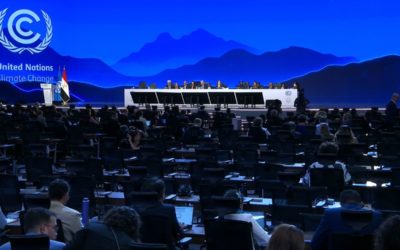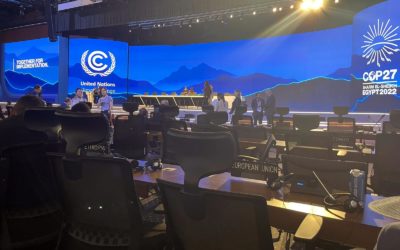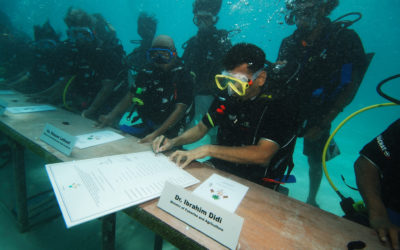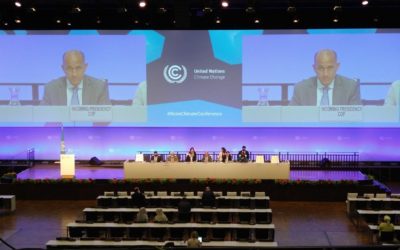As some time has passed since the COP27 UN climate conference has ended and the process celebrated its 30th anniversary, it is worth taking a look at the future of the climate negotiations.
The sense of urgency has not yet entered the room – taking stock of the first week of COP27
Just before midnight on Saturday evening, the technical negotiations of the UN COP27 climate conference currently taking place in Egypt have ended, giving the opportunity to the ministers arriving in the second week to reach political agreements. Although we have seen some progress and the positions of developed and developing countries have converged, there is still a lot of work ahead of the negotiators in the second week of the conference in order to be able to talk about real results in Egypt. A quick analysis by a colleague of the Green Policy Center on site.
UN climate conference – Balancing between finance and ambition
This week, the 27th annual climate conference of the United Nations the COP27 begins under the presidency of Egypt. The “African COP”, as the developing countries refer to the conference, faces serious challenges: it must simultaneously increase the ambition to reduce emissions in order to maintain the climate goals and preserve a ray of hope for small island states of survival, as well as meet the developing countries’ huge financial expectations. Will the Egyptian presidency manage to reach agreements acceptable to all parties and what role will the European Union play in all of this?
Although we are currently mostly occupied with the energy price crisis, we must not forget the challenges caused by climate change. That is why it is worth paying attention to Sharm el-Sheikh in Egypt, where delegates from nearly 200 UN countries are expected to discuss the most burning issues of international climate policy in the next two weeks. And there are plenty of burning issues; this year we have all felt the negative effects of climate change on our own skins, just think of the summer droughts and forest fires, or the floods in Pakistan that claimed 1,500 lives and caused 30 billion dollars in damages.
One of the most controversial topics in the coming weeks will be related to these events; the so-called Loss and Damage negotiations. According to the IPCC, the climate change scientific advisory body of the UN, climate change threatens the lives and livelihoods of 3.3-3.6 billion people in the future. Climate change strongly affects the poorest strata of the population, as they are much less able to adapt to its negative effects; developing countries are therefore demanding a new financial fund to compensate for the damage caused by climate change. Since developing countries generally emit less greenhouse gases and they are still affected by climate change, they are calling upon developed countries to finance this new fund due to climate justice and the “historical responsibility” of developed countries. However, opinions differ as to what amount would be sufficient; calculations are about expected damage between 1-1.8 trillion and 5.6 trillion dollars by 2050.
The United States, as well as the European Union and its member states, have so far opposed the establishment of a separate financial fund, fearing that, if it is created, there will be no limit to the financial claims of developing countries. During the negotiations, the EU has also underlined that there are already an existing fora for the topic under the UN umbrella, and that developed countries have undertook to mobilize 100 billion dollars yearly to support the climate protection efforts of developing countries. Since we have not yet succeeded in achieving this goal, the developing countries are distrustful of the developed countries for the time being.
In order to rebuild trust, several European member states have already offered resources to deal with Loss and Damage, and developed countries have pledged to double the resources offered for adaptation action. Furthermore, developed countries are also developing a delivery plan on reaching the 100 billion dollar per year goal, and started negotiations to define the new long-term climate financing goal as well. However, according to the position of the EU and its member states, public resources alone will not be sufficient to curb climate change, so we recommend starting negotiations on how to bring global financial processes in line with the 2050 climate neutrality goals. It is still an open question whether this topic will be on the agenda or whether developing countries will only see it as a distraction from the immediate mobilization of finance.
The chance of survival of small island states is an open question at the moment as well. If we cannot keep the rise of the global average temperature below 1.5°C, several of these countries may drown in the sea, so it is really a matter of life and death for them to reduce emissions as ambitiously as possible. Last week, the UN environment and climate change organizations both published their assessments on how we are doing in the fight against climate change. While we could be optimistic after last year’s climate conference because of the new commitments announced there. according to these latest analyses, we are no longer doing so well in terms of implementation. Among the major emitters, only the EU and the USA have reduced their emissions, while the global GHG emissions have reached new all-time record high levels. Another cause for concern is the fact that even if the current commitments are fully fulfilled, we can still expect a warming of around 2.8°C by the end of our century – not aligned with the 1,5°C pathway recommended by science and necessary for the survival of small island states.
For the EU and its member states, the progress under the mitigation work program up to 2030 during COP27 is therefore of outstanding importance, so that the countries of the world can formulate more ambitious climate policy steps as soon as possible. This is not only important for the survival of small island states, but if we can keep climate change under control, its negative effects will cause less loss and damage, and the we need to mobilize less resources to compensate for those. As we can see, everything is connected with everything, which is why the Egyptian COP presidency will be in a difficult situation in the next two weeks. We can hope for all of our sake that they manage to deliver on the expectations of all sides, both on ambition and finance.
Net Zero Banking – a new project to support the transition of the Hungarian banking sector to climate neutrality
The Green Policy Center is launching a new project in order to promote the gradual climate-neutralization of the portfolios of Hungarian banks, both by introducing banks to climate-neutral banking options on the supply side, and by increasing social awareness on the demand side.
Technical consultations with political undertones – assessment of the 2022 UN Bonn Climate Conference
Although the recent UN Bonn Climate Change Conference was to be held at a technical level, the negotiating parties were unable to circumvent the major political issues of emissions reduction, financing, and loss and damage. Thus, although serious discussions have taken place, the incoming Czech EU Council Presidency will have ample tasks on its hands, because negotiations need to shift to a higher pace during the autumn in order to respond to the urgency required by climate change. An on-site analysis of the outcomes of the conference by the Green Policy Center.
Ukraine’s accelerated EU accession from a green perspective
The Russo-Ukrainian war has created a political opportunity for Ukraine to gain admission to the European Union through an accelerated procedure, in contrast to the decades old practice of the past. Apart from the political, economic and security aspects of this situation, our present analysis reviews the climate policy aspects of a possible accession, examining whether the country is adequately prepared for it.
Evaluation of the COP26 Glasgow Climate Conference – meeting and not meeting expectations at the same time
The COP26 in Glasgow did almost everything it could, but in the same time it didn’t. This is a short summary of the outcome of the 26th annual Conference of the Parties to the United Nations Framework Convention on Climate Change, the COP26 in short. We at the Green Policy Center have evaluated the results of the conference shortly below, while the most important topics are explained in more detail in the following article. At the end you can also find a gallery of our personal impressions of the COP26.
Carbon Border Adjustment Mechanism: expectations and implications for the CEE region
The European Commission has long been preparing and feeding information to the public on its new climate instrument to even the international trade playing field for European companies, the so-called Carbon Border Adjustment Mechanism (CBAM). After the proposal has been leaked to the press lately, the Green Policy Center had a look at the text to see what it could mean to the CEE region.
On the way to COP26 – Results of the June 2021 intersessional climate meetings
The latest expert-level meeting of the subsidiary bodies of the UN Framework Convention on Climate Change (UNFCCC) was held from 31 May to 17 June to discuss important issues before the Glasgow COP at the end of this year. It was a session “full of firsts”, the conference was held online and it lasted for three weeks for the first time in the history of international climate negotiations. Moreover, this was the first formal session where no formal decision was made.
It is high time to talk about the details of creating a climate-neutral Hungary
Legislation stipulates that Hungary would reach the state of climate neutrality by 2050. With this, Hungary was among the first countries in the world to set this important goal in legislation, making it mandatory for all Hungarian stakeholders. Of course, many people do not even understand why climate neutrality is important and what does it actually mean for them.
Subscribe to our newsletter!
Contact us!
If you have any questions about our research and consulting services, please, feel free to contact us!










